
Novye Issledovaniya Tuvy-New Research of Tuva
metrics 2024
Connecting Scholars to Tuva's Cultural Narratives
Introduction
Novye Issledovaniya Tuvy-New Research of Tuva is a prominent open-access journal published by CH K LAMAZHAA since 2009, dedicated to advancing the fields of Anthropology, Cultural Studies, and History. With an impressive Q1 ranking in these disciplines and a robust presence in the Scopus database—ranking 65th in History and achieving a 96th percentile in Anthropology—it serves as an essential platform for researchers and scholars seeking to explore and disseminate new insights regarding the diverse cultural heritage and historical context of the Tuva region in the Russian Federation. The journal is committed to providing accessible, high-quality research, ensuring that vital information reaches a wide audience without barriers. By spanning the years 2016 to 2024, Novye Issledovaniya Tuvy not only reflects contemporary developments but also contributes significantly to the global discourse on cultural identity and historical narratives.
Metrics 2024
 -
- 1.60
1.60 0.80
0.80 -
-Metrics History
Rank 2024
IF (Web Of Science)
JCI (Web Of Science)
Quartile History
Similar Journals

Estudios Historicos
Pioneering New Insights into Historical MethodologiesEstudios Historicos is a distinguished academic journal dedicated to the exploration and analysis of historical events, theories, and methodologies within the field of historical studies. Published by the CENTRO DOCUMENTACION HISTORICA RIO PLATA PROF DR WALTER RELA, this journal serves as a critical platform for scholars and researchers interested in disseminating their findings on Latin American history, with a strong emphasis on Uruguay's historical context. The journal, bearing the ISSN 1688-5317, fosters an environment for rigorous scholarly debate and is committed to advancing the understanding of historical dynamics through interdisciplinary approaches. Although Estudios Historicos operates under a traditional access model, its potential for impact within the academic community is significant. With the objective of providing high-quality research and facilitating informative discussion, this journal invites contributions that push the boundaries of historical inquiry, making it a vital resource for students, professionals, and researchers aiming to deepen their knowledge and engagement with the past.
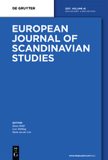
European Journal of Scandinavian Studies
Showcasing groundbreaking research in Scandinavian linguistics.European Journal of Scandinavian Studies is an esteemed journal published by Walter de Gruyter GmbH, dedicated to advancing scholarship in the fields of Cultural Studies, Linguistics and Language, and Literature and Literary Theory. Since its inception in 2010, the journal has been a pivotal platform for researchers and scholars, showcasing cutting-edge research and critical discussions pertaining to Scandinavian languages and cultures. With an ISSN of 2191-9399 and an E-ISSN of 2191-9402, the journal emphasizes accessibility to impactful academic work, despite its current non-open access model. While the journal is categorized within the Q4 quartile for Cultural Studies and Linguistics/Language, it has shown notable potential in ranking higher in its specialized domains, fostering a growing community of researchers invested in Scandinavian studies. The journal's office is located in Berlin, Germany, further enriching its European scholarly context. As it continues to evolve, the European Journal of Scandinavian Studies serves as a vital resource for academics seeking to engage deeply with the multifaceted aspects of Scandinavian culture and linguistics.
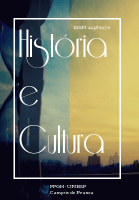
Historia e Cultura
Advancing Understanding of History and IdentityHistoria e Cultura is a distinguished open-access journal focusing on the dynamic and multifaceted exploration of history and culture within the context of the Humanities. Published by the UNIV ESTADUAL PAULISTA JULIO MESQUITA FILHO, FAC CIENCIAS HUMANAS & SOCIAIS, the journal serves as a vital resource for researchers, professionals, and students engaged in the fields of historical research and cultural studies. Since transitioning to open access in 2012, Historia e Cultura aims to democratize knowledge by providing free, unrestricted access to high-quality articles that foster scholarly exchange and innovation. Although the specific impact factor remains undisclosed, the journal is dedicated to contributing to the academic discourse through rigorous peer-reviewed research. Situated in Brazil, Historia e Cultura is well-positioned to address both local and global issues, encouraging critical engagement with cultural heritage and identity. Researchers and scholars are invited to submit their work, ensuring that diverse perspectives are represented in the study of our shared history.

JOURNAL OF THE POLYNESIAN SOCIETY
Connecting Scholars Through Polynesian NarrativesJOURNAL OF THE POLYNESIAN SOCIETY, published by Polynesian Soc Inc, is a distinguished periodical that aims to disseminate high-quality research in the fields of anthropology, archaeology, and cultural studies. With an ISSN of 0032-4000 and E-ISSN 2230-5955, this journal serves as a key resource for scholars and practitioners interested in the rich historical and cultural narratives of the Polynesian region. Since its inception, the journal has published a multitude of scholarly articles, reflecting a convergence of research from 1971 to 2022, thus establishing itself as a foundational text within its domain. The journal is indexed in notable categories with a Q4 ranking in anthropology and a Q3 in both archaeology and cultural studies as of 2023, highlighting its relevant contributions to the academic community. Moreover, its impressive Scopus ranks position it within the 80th percentile for archaeology and the 67th percentile for anthropology, showcasing its dedication to scholarly excellence. Although not an open-access publication, the journal remains a vital avenue for academic discourse and exchange, making it a significant resource for researchers, professionals, and students dedicated to understanding the diverse cultures of the Pacific Islands.
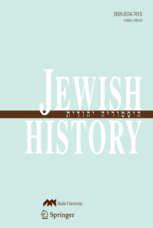
Jewish History
Connecting Communities Through Historical InsightsJewish History is a significant academic journal published by Springer, focusing on the multifaceted historical narratives of Jewish communities worldwide. With roots tracing back to 1986, this esteemed journal offers an intellectual platform where researchers and scholars can engage critically with the vast and rich tapestry of Jewish heritage, culture, and experiences. Although it operates under a traditional subscription model, the journal has gained a notable standing in recent years, achieving a Q4 ranking in Cultural Studies and a Q3 ranking in History for 2023, reflecting its robust scholarly contributions. The journal is indexed in Scopus, with a rank of #808 in Arts and Humanities History and #754 in Social Sciences Cultural Studies, placing it within the competitive landscape of academic publishing. Its commitment to advancing the field of Jewish studies makes it an essential resource for researchers, professionals, and students alike, who seek to deepen their understanding of Jewish history from historical, cultural, and social perspectives.

Lusotopie
Fostering Critical Discourse in Lusophone ResearchLusotopie is a distinguished academic journal dedicated to the exploration of cultural, social, and political dynamics in Lusophone societies, providing a pivotal platform for researchers and scholars in the fields of anthropology, history, and cultural studies. Published by Lusotopie, the journal features contributions that foster a deeper understanding of the linguistic, historical, and cultural connections across Portuguese-speaking communities, making it an essential resource for academics and professionals alike. With its ISSN 1257-0273 and E-ISSN 1768-3084, the journal aims to bridge interdisciplinary gaps while promoting critical discourse in the study of Lusophone regions. Although Lusotopie does not operate under an open access model, it remains committed to enhancing scholarly dialogue and disseminating significant research findings. The journal has cultivated a reputation for publishing quality articles, researched during its active years since 1999, thereby securing its place as an important contributor to the academic landscape of Mediterranean studies. Researchers, professionals, and students interested in the cultural intricacies and sociopolitical issues facing the Lusophone world will find Lusotopie an invaluable resource.

Studia Ethnologica Croatica
Advancing Ethnological Insights for a Global AudienceStudia Ethnologica Croatica is a distinguished open-access journal dedicated to the fields of ethnology and cultural anthropology, published by the University of Zagreb's Faculty of Humanities and Social Sciences. Since its inception in 1989, the journal has provided a platform for scholarly discourse and critical analysis of cultural practices, social structures, and ethnographic research pertinent to Croatia and beyond. With an impressive Q2 ranking in Cultural Studies and a strengthening presence in Anthropology (Q3), the journal is essential for researchers and practitioners alike, contributing significantly to ongoing discussions within these disciplines. Recognized on Scopus with notable rankings, it represents a valuable resource for those seeking to deepen their understanding of contemporary ethnological issues. The journal operates under an open access model, ensuring that its high-quality research is freely accessible to a global audience, thereby fostering collaboration and inspiring new inquiries within the social sciences.
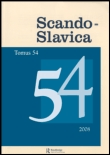
Scando-Slavica
Connecting Scholars: The Nexus of Scandinavia and Slavic StudiesScando-Slavica is a renowned academic journal published by ROUTLEDGE JOURNALS, TAYLOR & FRANCIS LTD, specializing in the rich interplay of Scandinavian and Slavic studies. With its ISSN 0080-6765 and E-ISSN 1600-082X, the journal has been a critical resource for scholars since its inception in 1954, covering a wide range of disciplines including archaeology, cultural studies, history, linguistics, and literature. As of 2023, it has consistently ranked in the third quartile across various categories, indicating its influential role in disseminating innovative research within the arts and humanities. With a focus on interdisciplinary dialogue, Scando-Slavica aims to foster a deeper understanding of cultural exchanges and linguistic connections, making it an essential read for researchers, professionals, and students interested in exploring the complexities of Nordic and Slavic interactions. While currently not an open access journal, its contributions have garnered substantial citations, bolstering its academic impact and relevance in a diverse scholarly landscape.

Journal de la Societe des Americanistes
Bridging Disciplines to Enhance Cultural UnderstandingJournal de la Societe des Americanistes, published by UNIV PARIS X PARIS-NANTERRE, ARCHEOLOGIE & ETHNOLOGIE, is a distinguished platform for the dissemination of scholarly research in the fields of anthropology and cultural studies. With an ISSN of 0037-9174 and an E-ISSN of 1957-7842, this Open Access journal has been making academic content freely accessible since 2016, fostering a global dialogue among researchers and practitioners. Based in France, this journal prioritizes interdisciplinary discourse, enhancing the understanding of cultural dynamics and ethnic diversity across the Americas. Although currently ranked in the Q4 quartile for anthropology and cultural studies, its commitment to rigorous peer-reviewed research places it in a unique position to contribute to the academic landscape. Researchers, professionals, and students seeking to explore intricate cultural themes and anthropological perspectives will find the Journal de la Societe des Americanistes an invaluable resource for their scholarly endeavors.
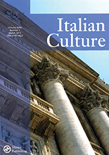
Italian Culture
Advancing Interdisciplinary Insights into Italian CultureItalian Culture is a critical scholarly journal published by Routledge Journals, Taylor & Francis Ltd, focusing on the multifaceted nature of Italian cultural expressions from the 1970s to the present day. With an ISSN of 0161-4622 and an E-ISSN of 1559-0909, this journal serves as an essential platform for researchers and scholars interested in the nuanced dynamics of Italian cultural heritage, sociopolitical contexts, literature, and the visual and performing arts. Despite its current categorization in the Q4 quartile in various fields such as Cultural Studies and Literature, it remains committed to publishing insightful interdisciplinary studies that challenge conventional narratives and contribute to ongoing scholarly discourse. Notably positioned in the United Kingdom, it offers unique perspectives on Italian identity and cultural production, making it a crucial resource for students, professionals, and academics alike. The journal's scope and its convergence of cultural studies will undoubtedly stimulate academic engagement and exploration within and beyond its established readership.